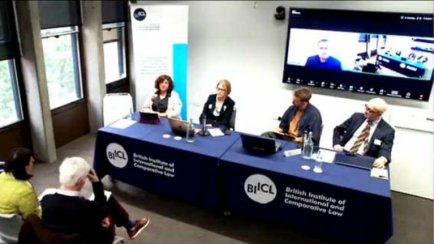Contact center of the Ukrainian Judiciary 044 207-35-46

The challenges faced by judicial systems in the era of rapid development of artificial intelligence, especially in the context of armed conflict, were the subject of a lively panel discussion "AI in the Courts: Ground-Breaking Standards from the Council of Europe and Perspectives From the Member States", which took place on 9 June 2025 within the framework of the BIICL project "The Dynamics of the Judiciary in Ukraine in the Context of the Rule of Law and the EU Accession Aspirations" and the Bingham Centre for the Rule of Law and Maurice Wohl European Law Fellowship Programme.
The final chord of this in-depth discussion came from Oleksandra Yanovska, a judge of the Supreme Court in the Criminal Cassation Court, who offered the participants an insider's view of the judicial system operating in the exceptional conditions of a full-scale war.
"We are working in a hybrid war, where justice has to withstand not only physical threats, but also cyber-attacks that deliberately disrupt justice systems that are increasingly taking advantage of automation," the judge said. However, despite these threats, justice in Ukraine does not stop. According to Oleksandra Yanovska, judges, court staff and digital solution developers continue to do their work with dedication, ingenuity and a deep awareness of their mission.
In this context, the judge outlined the digital solutions currently used by Ukrainian courts: systems for user registration, document exchange, video communication, and the development of a modern database of court decisions with a convenient search mechanism. In her opinion, Ukraine's experience can be a valuable source of knowledge for other countries, in particular on how to ensure access to justice in the most difficult circumstances.
Attention was also paid to discussions around the legitimacy of court decisions made with the participation of AI, as well as the role of software developers - whether they can actually influence justice and how to prevent it. The participants of the event concluded that the introduction of AI in courts should not only comply with technical standards, but also involve judges themselves, who should understand the logic of algorithms and be able to critically evaluate their work.